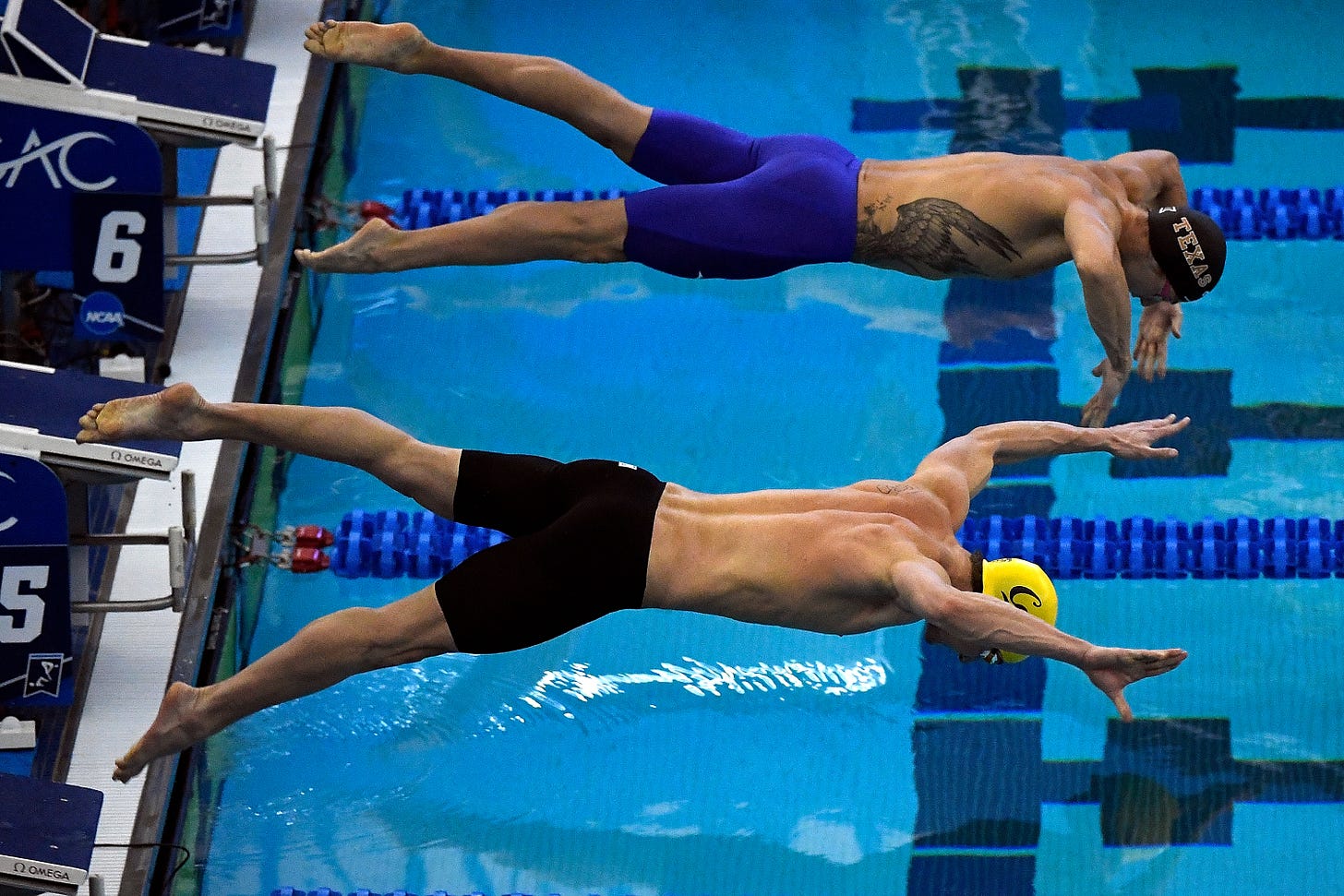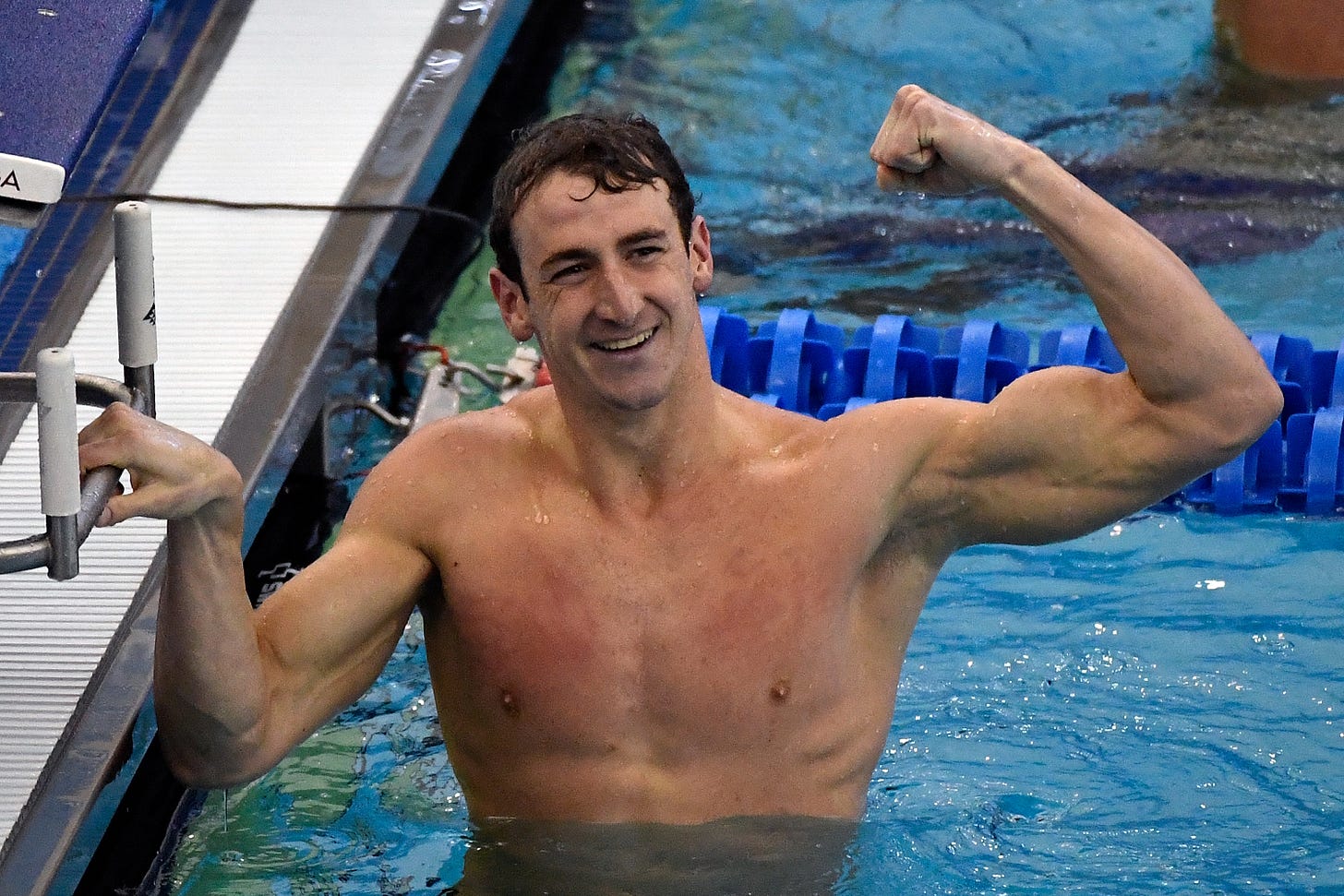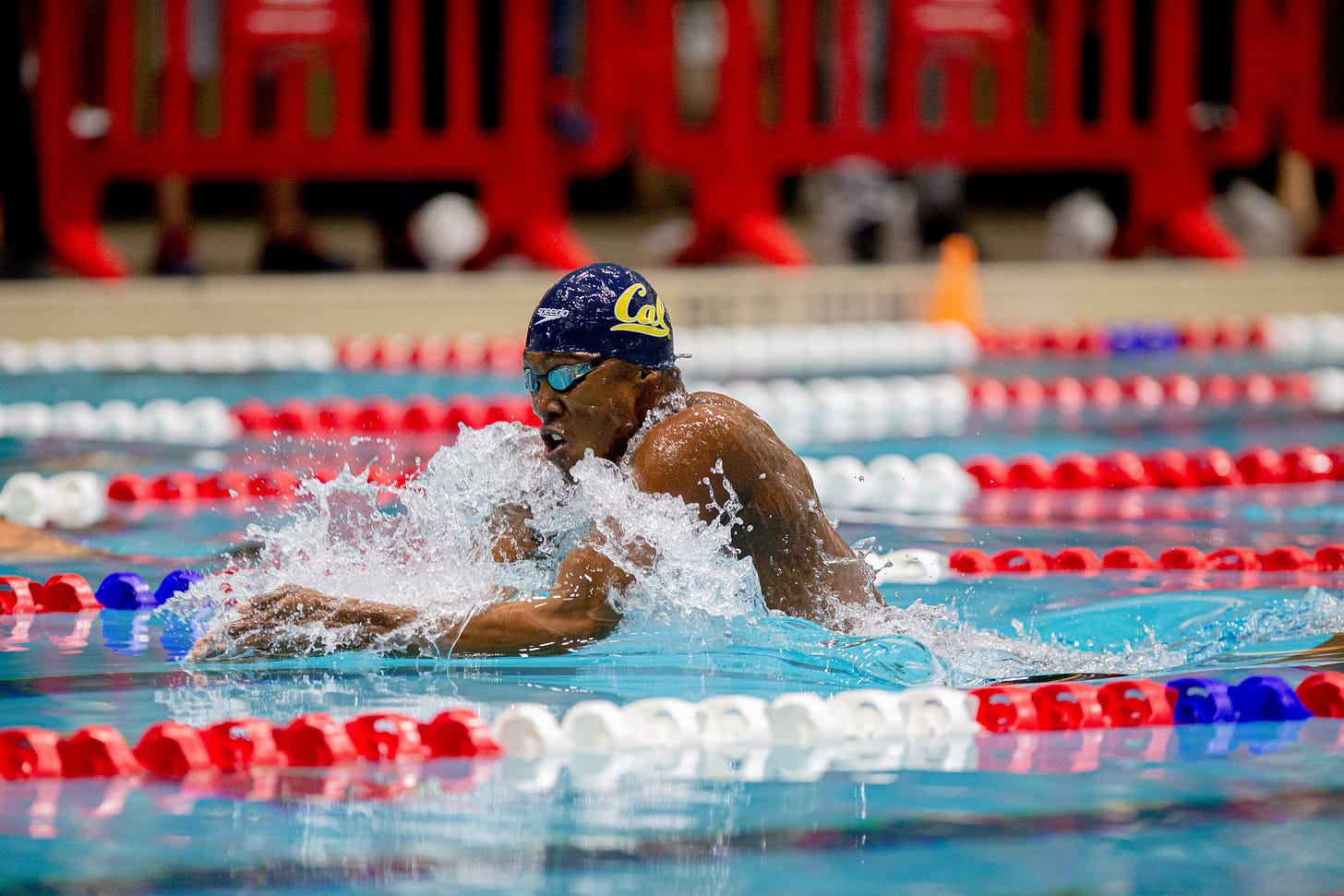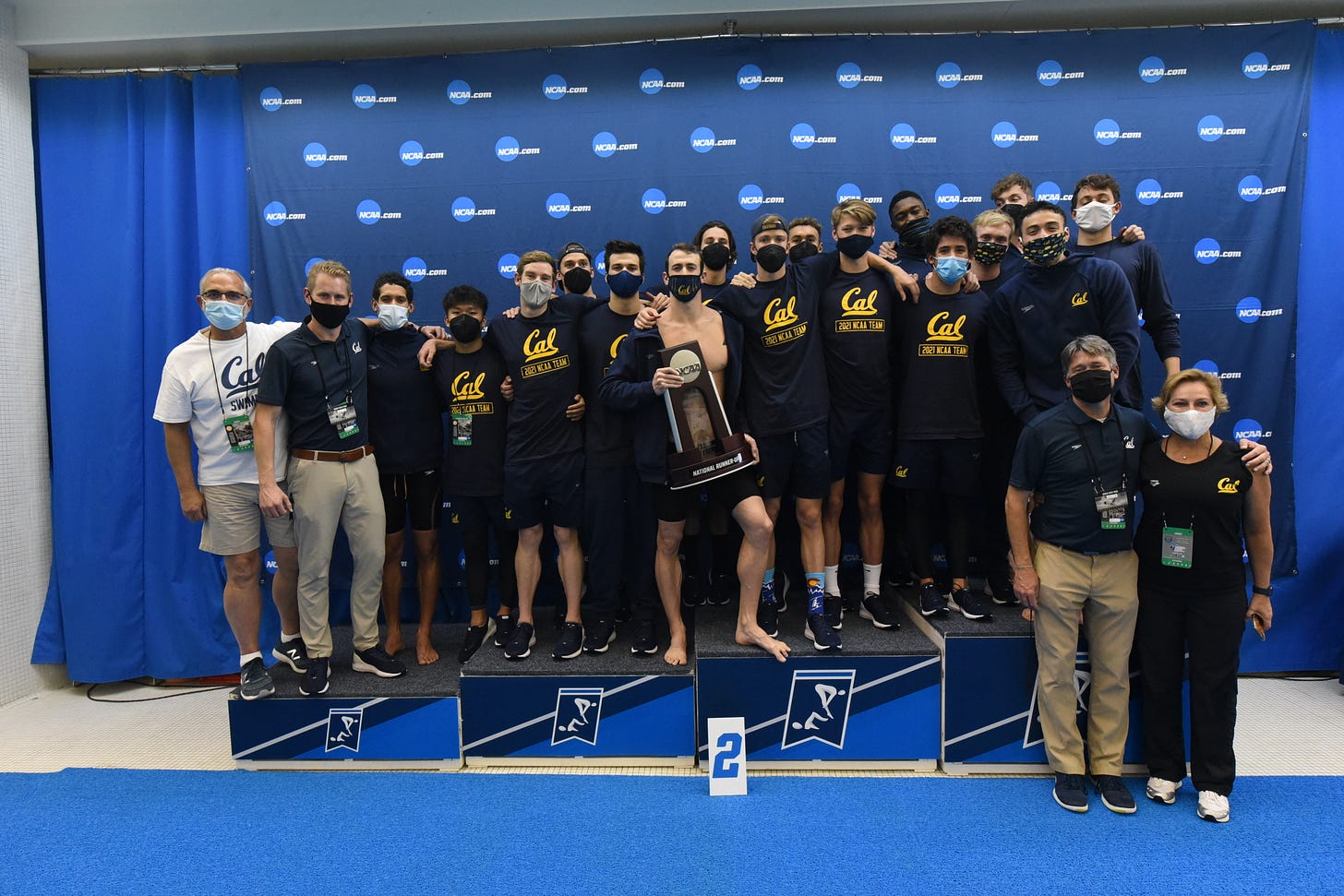Cal Men's Swimming and Diving Loses to Top Rival, Texas Longhorns
A disappointing second-place finish for the 5th time in 6 NCAA Championships
As fans, you dream of the national championship ending with a buzzer-beating 3-pointer or the hail mary against all odds. It’s the uncertainty and the suspense of the moment when the Kawhi Leonard fadeaway jump shot dances around the rim a few times before falling through the net that brings fans to the edge of their seat. In collegiate swimming where the team aspect of sports is actually pertinent, there’s nothing like a 400-yard freestyle relay, the final event of a four-day competition, that could dictate the outcomes of the championship.
Going into the final race, there was a clear path, albeit the narrowest of alleys, for victory—win the race while Texas finishes in 16th or lower and be crowned champions. Lose and wonder for another 12 months how to beat the Longhorns who have won 5 of the last 6 NCAA Championships (Cal won in 2014 and 2019). But, the public health restrictions in place put a new twist that eliminated some of the gamesmanship of racing as only 4 teams (instead of usual 8) can compete in a given grouping, which put Texas in the heat after the Bears with full knowledge of their results. Despite the fatigued legs, the Cal relay squad did their job; they edged out a talented foursome of freestylers from Florida to have the fastest time going into the final heat, but it wasn’t enough as Texas finished in fourth place and secured their 15th overall national title.
Finishing in the top-two for the 11th straight year is a feat worth celebrating. But when you consider the 27-point margin is one of the smallest in recent years, you wonder what could have gone differently. Perhaps the simplest answer, and as freshman Bjorn Seeliger noted on live television, “we might need to hire some divers.” The 568 points that the Bears accumulated were the most by any runner-up at the NCAA Championships and more than any champion in this decade-long run, but none of it came in diving. Texas, on the other hand, earned 595 points—83 of which came off the springboards and platform. This has become a trend where Cal scores more swimming points (happened in seven of the 11 NCAA championships), but it’s not enough to overcome the deficit from diving (happened in three).
The thought, as it was in 2019 when the Bears won, was that this incredibly talented senior class could overcome anything thrown at them. Ryan Hoffer set personal bests en route to becoming a three individual event winner (tied with Texas A&M junior Shaine Casas) in the 50- and 100-yard freestyle as well as the 100-yard butterfly. He also helped lead the Bears to two relay victories and finished in second and third in the other relays. His performance likely puts him at the forefront of the CSCAA Swimmer of the Year award. Trenton Julian had three top-four finishes with a victory in his best event (the 200-yard butterfly) eluding him by .21 seconds. Backstroke duo Bryce Mefford and Daniel Carr scored a combined 61 points in the 100- & 200-yard backstroke and the 200-yard individual medley. Sean Grieshop and Zach Yeadon held down swimming’s longest races for an additional 53 points. As a group, they scored 222 individual points (the most by any single class on a team), which would have finished 5th overall (factoring in relays they would have been in a tight battle with Florida for third). To summarize, here are their results:
Ryan Hoffer (60): 50y freestyle (1st - 18.33), 100y freestyle (1st - 40.89), 100y butterfly (1st - 44.25), 200y freestyle relay (1st - 1:14.36), 400y freestyle relay (1st - 2:46.60), 200y medley relay (3rd - 1:22.43), 400y medley relay (2nd - 3:00.73)
Trenton Julian (48): 200y freestyle (3rd - 1:31.55), 500y freestyle (4th - 4:09.78), 200y butterfly (2nd - 1:38.85), 800y freestyle relay (2nd - 6:08.68)
Bryce Mefford (36): 200y individual medley (9th - 1:41.86), 100y backstroke (8th - 45.52), 200y backstroke (3rd - 1:38.31), 800y freestyle relay (2nd - 6:08.68)
Sean Grieshop (31): 500y freestyle (7th - 4:11.82), 400y individual medley (3rd - 3:38.73), 1650y freestyle (14th - 14:48.98)
Daniel Carr (25): 200y individual medley (9th - 1:41.86), 100y backstroke (8th - 45.52), 200y backstroke (3rd - 1:38.31), 800y freestyle relay (2nd - 6:08.68), 200y freestyle relay (1st - 1:14.36), 200y medley relay (3rd - 1:22.43)
Zach Yeadon (22): 500y freestyle (9th - 4:11.37), 200y freestyle (31st - 1:34.89), 1650y freestyle (6th - 14:36.06)
In addition to those six, Cal had a pair of juniors and a pair of freshmen that performed admirably in their runner-up finish. Juniors Hugo Gonzalez and Reece Whitley controlled the breaststroke and provided additional talent in the individual medley with 42 and 36 points, respectively. Freshman Destin Lasco proved to be the spiritual successor to legend Ryan Murphy when he eclipsed Murphy’s freshman times in the 100- and 200-yard backstroke as well as the 200-yard individual medley, while providing quality relay swims. In fact, Lasco nearly broke Ryan Murphy’s NCAA record in the 200-yard backstroke but ultimately fell .26 seconds short on his way to second-place. Seeliger established himself as the backbone of Cal sprinting over the next three years with his runner-up finish in the 50-yard freestyle and his fourth-place in the 100-yard freestyle, while also being a critical factor in four relays.
The overwhelming majority of scoring for Cal came from the aforementioned 10 swimmers, but as I mentioned in my conference championship preview, who are the 11th through 16th swimmers? Sophomore Colby Mefford and freshman Dare Rose, both of whom seemed to be past their taper, each contributed a handful of points (7 total), which in a meet that came down to just 27 points cannot be taken lightly. Texas had all 16 swimmers and 4 divers score. All but 4 contributed double-digit points. Give credit where credit is due—Texas head coach Eddie Reese and diving coach Matt Scoggin built an incredible program. They, and the Texas athletes, have earned every bit of the goliath status they currently have. The reality is that they will be just as good, if not better, next year, the following year, and every year after that (they might have a short downturn when Coach Reese eventually retires).
The Bears were far from perfect with many missed opportunities—too many second and third place finishes, bad relay swims, rough prelim sessions, and not enough personal-bests. To beat a team like Texas that excels in both swimming and diving, Cal needed to be near-perfect. But, ultimately, they lost because they lacked the depth that Texas had, who not only had every competitor score but also left athletes behind who couldn’t compete due to standard maximum roster limits at the NCAA Championships. Regardless, their runner-up finish is worth celebrating. Not even Texas can claim a streak as long as the current one under head coach Dave Durden (Texas finished in 5th in 2013 when the only non-Cal and non-Texas team, Michigan, won in the 2010s).






All too familiar a storyline (for both the men's and women's programs). Strong to dominant swimming, few if any points for diving. The Legends Aquatics Center, with state of the art diving facilities, has been open for 4+ years now. When will the diving recruits start putting Cal on their maps?